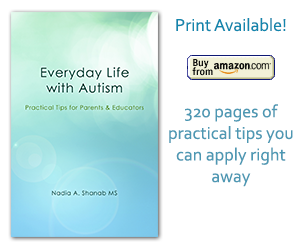By Nadia Shanab | Uncategorized
The Autism File U.S.A is a free digital magazine offering resources, information and support. You can download it here. The Autism File magazine is a bi-monthly publication. Its first issue appeared in 1999. Enjoy! nadia shanab
Tags: asperger's syndrome, autism, health, parenting, research, social interaction, symptoms of autism, techniques
Posted in Uncategorized | Comments Off on A Free Autism Magazine
By Nadia Shanab | Uncategorized
The ratio of boys to girls diagnosed with autism is around four to one. Is that really true? Is research biased to diagnose boys and overlook girls? Are girls able to camouflage the signs of autism? Research found that: male and female brains are different anyway, male’s brain has more tissue volume girls with the
Tags: autism, diagnosis, female brain, health, male brain, research, signs
Posted in Uncategorized | Comments Off on Autism and Gender
By Nadia Shanab | Uncategorized
A new school year is around the corner and about to emerge! Parents and educators are you ready? Here are some tips to help you get off on the right foot. Bear in mind, there are three main goals in raising and educating children with autism that we are working on: Independence Better Social Skills Stronger Communication
Tags: autism, back-to-school, communication, discipline, early intervention, flexibility, health, independence, organization, parenting, placement, research, schedule, sensory, social interaction, tips, visual aids
Posted in Uncategorized | Comments Off on Parents & Educators, Are You Ready for A New School Year?
By Nadia Shanab | Uncategorized
A new study found that the brain chemistry in children with autism was found to be different compared to others with developmental delays (DD). In the early years of childhood, the brain chemistrey takes a different path during its development. Brain chemistry changes over time. It is never enough to emphasize the importance of early
Tags: autism, brain chemistry, developmental Delay (DD), early intervention, health, parenting, research
Posted in Uncategorized | Comments Off on Children with Autism Have Different Brain Chemistry
By Nadia Shanab | Uncategorized
Although some children with autism exhibit poor attention skills, a research suggests that autism cannot be blamed for. The main three autism traits are: Poor social skills Poor communication skills Limited areas of interest The cause of holding these signs accountable for autism has not been found yet. The study suggests to take the following
Tags: ADHD, autism, communication, parenting, research, social interaction, symptoms of autism
Posted in Uncategorized | 2 Comments »
By Nadia Shanab | Uncategorized
Asperger’s Syndrome used to be classified as a distinct disorder different from the ASD (Autism Spectrum Disorder). The new (DSM-5) Diagnostic and Statistical Manual of Mental Disorder has simply included the Asperger’s Syndrome within the ASD. By doing this the disorder loses its diagnosis and becomes part of the autism spectrum. A compromise would be
Tags: asperger's syndrome, autism, DSM-5, health, parenting, research, sensory, social interaction, symptoms of autism
Posted in Uncategorized | Comments Off on A Dilemma: Where Does Asperger’s Syndrome Belong?
By Nadia Shanab | Uncategorized
The way ASD (Autism Spectrum Disorders) has always been diagnosed, is based on the professionals’ (pediatrians, psychologists, psychiatirics, specialized therapists…) social interaction with the child. Then, the professional’s opinion supported by parents observations are usually the traditional way to give a child a diagnosis. This novel technology can provide a more accurate, objective, and early
Tags: autism, communication, diagnosis, early intervention, health, parenting, research, sensory, social interaction, speech, symptoms of autism, techniques
Posted in Uncategorized | Comments Off on A New More Accurate Way to Diagnose and Treat Autism
By Nadia Shanab | Uncategorized
Here is another research to confirm a correlation between autism and genetics. The cerebellum is involved in the expression of autism condition/ behavior. Read the full article here. nadia shanab
Tags: autism, development, genes, health, parenting, research
Posted in Uncategorized | Comments Off on Genetics and Autism
By Nadia Shanab | Uncategorized
One short way to define autism used to be : “A different brain wiring”. The study mentioned below proves that this definition is absoutely correct. A new study reported yesterday (July 22, 2013) by HealthDay News (Serena Gordon) about how the autistic brain is wired. Results of the study were published July 22 online in
Tags: autism, brain wiring, health, parenting, research, symptoms of autism
Posted in Uncategorized | Comments Off on A New Study to Help Define The Biological Basis of Autism
By Nadia Shanab | Uncategorized
Researchers believe that “gentetics” and “environmental” factors are two of the main causes of autism. The exposure to heavy metals -like lead, cadmium, and mercury- is believed to represent one of the environmental threats to the child’s development. A new research published today in ScienceDaily is announcing great news for parents. The research run in Seychellels,
Tags: autism, communication, health, heavy metals, mercury, parenting, research, social interaction, symptoms of autism
Posted in Uncategorized | Comments Off on No Correlation between Prenatal Exposure to Low-Level Mercury and Autistic-Like Behavior

